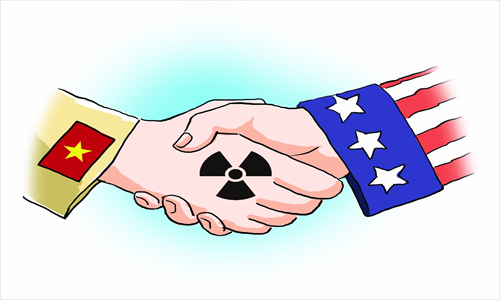US-Vietnam nuclear deal not a reminder of Cold War

Illustration: Liu Rui/GT
Since the signing of the US-Vietnam Civil Nuclear Cooperation Agreement in October, which commits the US to sell nuclear fuel and technology to Vietnam, an intense debate has arisen over its significance.
Supporters of the agreement hail it as a step forward in the process of deepening relations between the US and Vietnam and say it is beneficial for both countries.
For Vietnam, it represents the capacity to produce its own nuclear power energy and reduce its dependence on imports to meet the increased energy demand of a growing economy. For the US, the agreement opens up the opportunity for US businesses to make inroads in the second largest nuclear power market in East Asia.
Opponents of the treaty criticize it from several angles. Non-proliferation advocates are concerned over the lack of stringent controls and the possibility of Vietnam becoming another nuclear power, which could destabilize the regional situation and undermine US President Barack Obama's vision of a global non-proliferation treaty.
Vietnamese experts are worried about the safety aspect of the government's ambitious nuclear energy program, which calls for the building of 13 nuclear reactors in the next 20 years. They believe the country does not have the infrastructure to run a safe nuclear program, and the waste of billions of dollars in the project may lead to an environmental disaster, as in the cases of Chernobyl in Ukraine and Fukushima in Japan.
From China, some analysts suspect that the treaty may be a ploy to implement a US containment policy against China. While concerns over the strategic implications of the US-Vietnam deal are legitimate, they must be put in a proper perspective.
While the US is concerned about the implication of China's rise and the intention of its military modernization program, no one in the US would want a return to the Cold War and containment with all the dangers and costs such a policy entails.
The aim of the US pivot to Asia is not to contain China, but to hedge against the possibility of being excluded from the world's most economically and strategically important region.
Whether the hedging will turn into containment depends on Chinese policy and other Asian countries' response to US entreaties. Since ASEAN countries don't want to be caught in a new cold war between China and the US but want to be on friendly terms with China, they have responded well, albeit with a mixture of reservation and hope, to the second "charm offensive" conducted by Chinese President Xi Jinping and Premier Li Keqiang during their recent visits to Southeast Asia.
While seeking to improve relations with Vietnam, the US has no strategic interest in helping Vietnam become a nuclear power. Having enough headaches with the danger created by the North Korean nuclear issue, it certainly does not want to turn Vietnam into a new nuclear monster.
For Vietnam, it would be foolish to pursue a nuclear bomb. Such a policy would drain Vietnamese resources and create frictions with China. Seeking nuclear deterrence against a neighbor with an overwhelming conventional and nuclear capability is not a sane policy.
Furthermore, Vietnam is a signatory to the Southeast Asian Nuclear Weapon-Free Zone Treaty. Breaking the commitment not to seek nuclear weapons would antagonize its ASEAN neighbors, undermine ASEAN solidarity, and leave the country dangerously isolated.
The treaty is not a done deal. It cannot be implemented until the US Congress ratifies it, and some in Congress and the academia have called for more stringent controls.
The US is not the only country that has agreed to build a nuclear reactor for Vietnam. Vietnam has signed nuclear agreements with India, Russia, and Japan. China's concerns could be better handled if the concern over a Vietnamese nuclear bomb is separated from the concern over possible US containment.
The US-Vietnam nuclear deal presents China and the US an opportunity to work together to stop nuclear proliferation across the board, not only in Vietnam but also in Iran and North Korea, thereby chipping away the need for hedging and containment.
Turning the challenge into opportunity is the best response to the US-Vietnam nuclear deal.
The author is an associate professor at the College of Humanities and Social Sciences, George Mason University. opinion@globaltimes.com.cn
Related article: Downgrading requirements raises risk of proliferation